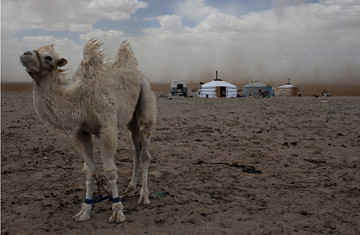
Nomads still live in traditional gers around Mongolia's biggest economic undertaking: the Oyu Tolgoi mine.
(6 of 6)
Wherever I go in Mongolia, people use metaphors drawn from the natural world. Mongolia, I'm told, is a wolf economy. People are described as eagles or camels. Serious political analysts tell me local elections in October will depend on whether the summer is rainy. The Russian bear and Chinese dragon loom large. But many young people in Ulan Bator, it turns out, have never ridden a horse or experienced the fabled freedom a nomad's life holds. With economic opportunity concentrated in the capital, Ulan Bator's population has nearly doubled in less than a decade, to 1.2 million. The legendary bond between Mongolians and their land is fraying. No one wishes the harshness of a herder's life on anyone. But there is a wistfulness in Ulan Bator these days, a yearning for a time when the rhythms of animals and seasons dictated life. "Nature is what makes Mongolia unique," says Erdenechimeg Dashdorj, an environmental lawyer. "If we lose that, we will be like any other country."
One summer day, Elbegdorj holds a picnic with his family in the woods behind the presidential residence. There is a burbling stream, silvery birch trees and plentiful grilled meat. Sitting on a plastic chair in a mossy hollow, clutching a mug that says virginia is for lovers, the President tells me his dreams for his homeland. "I see Mongolia as a hub for Europe, Asia and North America," he says. "We want to be an energy hub, a transportation hub, a communications hub, an agricultural hub, a tourist hub."
My mental map of Mongolia is crowded with all these hubs. I can't help recalling that practically all of Mongolia's exports are mineral-related. But an American p.r. rep, who has removed her Kate Spade heels for a setting more rustic than the usual presidential banquet, nods encouragingly. (Elbegdorj and Enkhbayar have dueling Western p.r. firms.) "Mr. President, what is it you told me about horses the other day?" she asks. Elbegdorj takes the cue. "Mongolia is a country where people are just getting off their horses and going to the cities for the first time," he says, his plump figure not necessarily evocative of the lean life of a nomad. "The spirit of freedom, of independence, is in our blood." Says the p.r. rep, with a smile: "Just like America." We take bites of grass-fed beef. Before us, Mongolia opens up like the Wild West, laced with risk but also graced with limitless possibility.
